Data from ACI World demonstrates dramatic impact of COVID-19
Financial assistance and relief is needed to safeguard essential operations and protect millions of jobs generated by the airport industry.
ACI World’s data has revealed that global passenger traffic declined by an unprecedented 94.4 per cent year-over-year in April as a result of COVID-19.
This followed an already dramatic drop of 55.9 per cent in March, representing the worst decline of global passenger numbers in the history of the aviation industry.
Global passenger traffic experienced an overall drop of 41.8 per cent for the first four months of 2020 with the 12-month rolling average for the global industry continuing to decline.
Global air freight volumes declined by 22.6 per cent compared to April 2019 resulting in a 10.8 per cent drop for the first four months of 2020. The global 12-month rolling average continued its negative trend to sit at 5.3 per cent by the end of the month.
Airports in some regions are now embarking on restarting operations and making plans for a sustained, long-term recovery. ACI World has said that financial assistance and relief is needed to safeguard essential operations and protect millions of jobs generated by aviation.
“April was devastating for the aviation industry as global air travel almost came to a complete halt with national governments making unilateral decisions to implement strict confinement measures in the second week to contain the COVID-19 outbreak heavily affecting the movement of passengers,” ACI World Director General, Luis Felipe de Oliveira, said. “Coordinated actions must be planned in supporting the industry restart to avoid the lack of coordination we faced as the restrictions were first applied on travel around the world.
“As in previous months, global air freight volumes have not been affected to the same extent as passenger traffic. Recently converted passenger aircraft into temporary freighters helped the cargo industry to move time-sensitive shipments and vital supplies, including urgent medical supplies and goods to support the global economy.
“Airports, like other industry sectors, need urgent relief and assistance to help them as they begin to restart operations, to navigate the far-reaching economic ramifications of the crisis and help lay the foundation of a balanced recovery. Any policies supporting the reduction of income from airports or a blanket slots waiver will damage the ability of airports to lead the industry recovery which includes several sectors working within the airports ecosystem.
“Airports continue to face high fixed costs, rising costs, related to health measures at airports and the challenge of creeping increases in the cost of capital. ACI World believes government assistance is needed to address these costs, to help safeguard essential operations, and protect millions of jobs.”
source : https://www.internationalairportreview.com/news/120198/aci-world-impact-covid19-financial-assistance/
Changi Airport Introduces Touchless Check-In, Biometric Kiosks
Singapore’s Changi Airport has announced a number of new measures to allow passengers to safely travel through it during the COVID-19 pandemic, including biometric immigration kiosks, touchless check-in, and various cleaning innovations.
The measures are being rolled out airport-wide in anticipation of air travel resuming out of Singapore in the coming weeks. Upon arrival, passengers will be able to use touchless kiosks with proximity sensors powered by infrared technology that will allow them to select options and enter their travel details by holding their finger close to — but without having to actually touch — a display screen.
For passengers needing to go through immigration, new biometric kiosks will use iris and facial recognition for the primary means of authentication in automated immigration lanes, replacing the previously used fingerprint scanners as a contactless and more hygienic solution that may help mitigate the spread of the COVID-19 virus.
“Passengers will expect airports to deliver the highest standards of safety and hygiene to give them peace of mind during their journey and we will rapidly bring on board new measures as we go into a new normal for air travel,” said Tan Lye Teck, Changi Airport Group, Executive Vice President for Airport Management.
Changi Airport Group (CAG) is also deploying upgraded autonomous cleaning robots that now feature a nozzle for the spraying of a light disinfectant mist on carpets and floors during cleaning, and will also be testing the use of ultraviolet-C (UC-C) LEDs for the disinfecting of handrails on escalators.
CAG will also be trialling contactless elevator buttons that will use infrared sensors — similar to what is being implemented at check-in kiosks — to allow passengers to select a floor by hovering their finger over the corresponding button.
“The improvements we have announced demonstrate CAG’s continuous commitment to passenger health and a positive airport experience,” said Teck. “CAG will work with other aviation partners to instil a high sense of confidence among travellers going through Changi Airport when air travel eventually resumes.”
Changi had previously installed a temperature screening solution at various points in the airport, as well as mandating physical distancing protocols and the wearing of masks by all staff and passengers, in addition to already enhanced cleaning practices for commonly touched surfaces.
Source: TR Business
Japan to set up coronavirus testing centres near major airports for overseas travellers
The centres at Narita, Haneda and Kansai airports, plus in central Tokyo and Osaka, plan to offer PCR tests for travellers By Kasey Furutani Posted: Friday July 3 2020, 2:00pm
Even though Tokyo and the rest of Japan have completely reopened, the country’s borders are still closed to 129 nations and regions.
However, with talks of a travel bubble currently ongoing, Japan is planning ahead to ease international travel restrictions. According to The Japan Times, the government is looking to build new Covid-19 coronavirus testing centres near Narita, Haneda and Kansai airports, the country’s three major international hubs, as well as in central Tokyo and Osaka.
The airport testing centres are expected to be used for travellers landing in Japan while the city testing centres could be used by travellers leaving Japan. For the latter, the government is in discussion to issue an official certificate for negative PCR tests, but the details have yet to be confirmed. The testing centres could open as early as this summer.
As of now, those arriving in Japan must take a polymerase chain reaction (PCR) test upon landing at the airport, and sometimes have to wait days for results. According to the report, the new centres could perform up to 4,000 PCR tests per day. Currently, in-house airport testing only administers about 1,000 tests a day. This will release travellers from airport purgatory much faster, possibly in just a few hours.
There are now 129 nations and regions on Japan’s entry ban list, which was updated on July 1, and rules for foreign residents are still strict – they cannot return to Japan unless they left Japan under ‘exceptional circumstances’. Let’s hope with this recent development, travel laws will relax and Japan will accept travellers and foreign residents again soon.
Keep up to date with the coronavirus situation in Tokyo and Japan here.
source : https://www.timeout.com/tokyo/news/japan-to-set-up-coronavirus-testing-centres-near-major-airports-for-overseas-travellers-070320https://www.timeout.com/tokyo/news/japan-to-set-up-coronavirus-testing-centres-near-major-airports-for-overseas-travellers-070320
Changi Airport rolling out contactless check-in kiosks, immigration counters
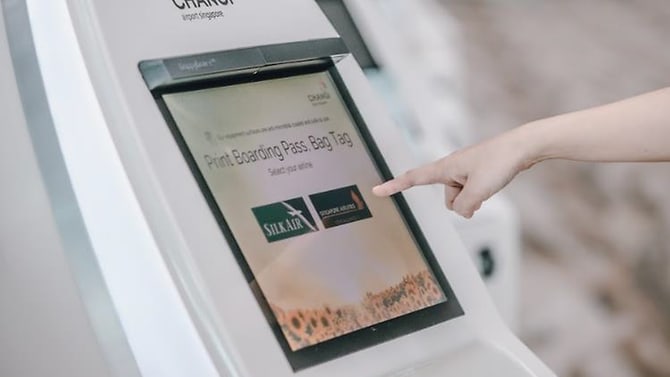 Passengers can hover their fingers above the screens for a contactless check-in and bag-drop process. (Photo: Changi Airport Group)
Passengers can hover their fingers above the screens for a contactless check-in and bag-drop process. (Photo: Changi Airport Group)
SINGAPORE: Changi Airport will be rolling out contactless check-in kiosks which will allow travellers to check in and drop off their luggage without needing to touch the electronic screens.
The upgraded kiosks are part of precautionary measures against COVID-19 and in preparation for the resumption of air travel, Changi Airport Group (CAG) said in a news release on Wednesday (Jul 1).
More than 160 automated kiosks in Terminal 1 and 3 will be progressively installed with proximity touch screens and infrared sensors to track finger movements.
READ: Contactless service and cleaning robots: Here’s what your next travel experience may be like
Touted as the first of its kind in any airport, the upgraded kiosks will allow passengers to check-in or drop off their luggage without any contact on the screen, CAG said.
For an extra layer of protection, the screens of the automated kiosks have also been sprayed with a long-lasting anti-microbial disinfectant coating that reduces the risk of virus transmission, CAG said.
For passengers who need to check-in at counters manned by customer service agents, acrylic screens will provide a barrier between passengers and staff. These screens are also installed at immigration, customs, GST refund and information counters.
A trial is underway for the use of contactless infrared technology on lift buttons, CAG said.
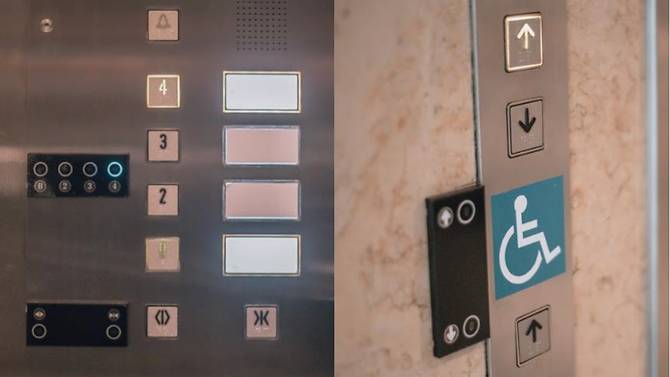
The Immigration and Checkpoints Authority (ICA) has also upgraded the automated immigration lanes with a new biometric system that uses facial and iris recognition as the primary means for identity verification. This replaces traditional fingerprint scanning.
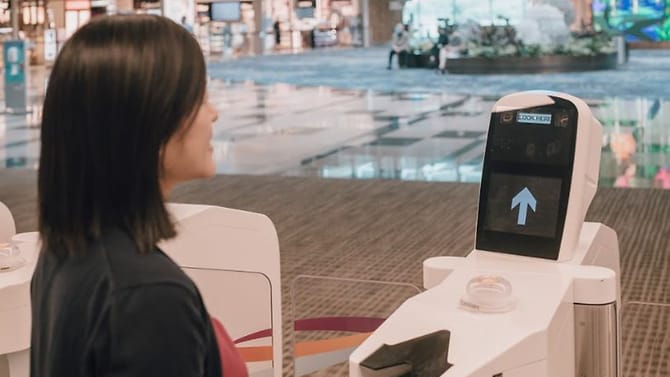
After scanning their passports, travellers who have enrolled their iris and facial biometrics will have their identity verified by iris and facial scan cameras. Passengers will only be prompted to scan their fingerprint if the scans are unsuccessful or if they had not previously submitted their biometrics.
Other improvements announced by CAG include autonomous cleaning robots equipped with an attachment that sprays a disinfecting mist on carpets and floors during cleaning. It is also testing the use of ultraviolet-C (UV-C) LED light technology to disinfect handrails on escalators and travellators.
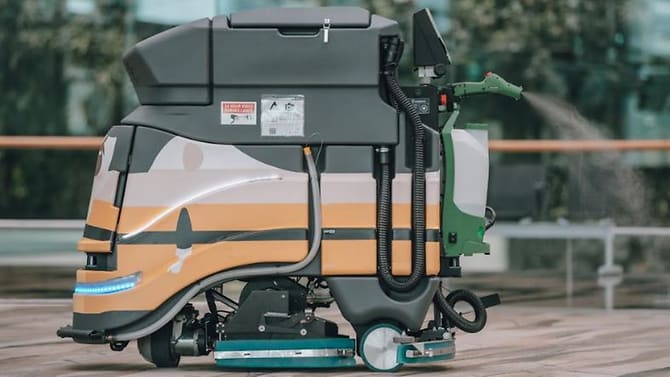
Air travel took a hit when countries closed their borders due to lockdown measures meant to curb the spread of COVID-19. Though airports have now gradually reopened and flights are slowly resuming, there still remains the risk of a second wave of infections.
Singapore reported four imported COVID-19 cases on Wednesday.
“Passengers will expect airports to deliver the highest standards of safety and hygiene to give them peace of mind during their journey, and we will rapidly bring on board new measures as we go into a new normal for air travel,” said Tan Lye Teck, CAG’s executive vice-president of airport management.
Lufthansa opens walk-in COVID-19 testing facilities at Frankfurt and Munich airports
By Megha Paul On Jul 2, 2020
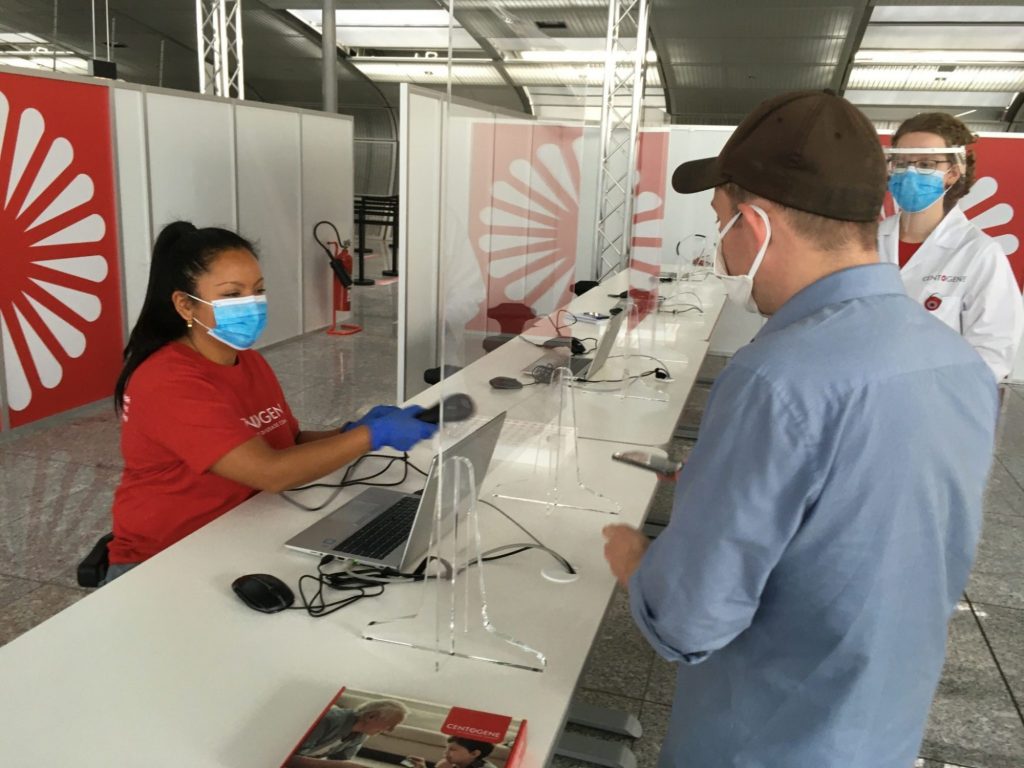
Lufthansa passengers can now get tested for COVID-19 at Frankfurt and Munich airports to avoid being quarantined, when arriving in Germany and Austria. In Frankfurt, the airline has joined forces with Fraport and German company CENTOGENE to offer COVID-19 testing to passengers flying to and from Frankfurt Airport.
Serving as a blueprint to opening international borders, this walk-in testing solution will allow passengers to get tested for the virus and avoid going into a 14-day quarantine when arriving in Germany, Austria and other countries worldwide.
The facility uses certified PCR (polymerase chain reaction) testing kits and passengers flying to or from Frankfurt Airport with Lufthansa will be able to perform the test at a sampling centre located near the main terminal. This can either be completed the day before travelling or with a fast track solution the same day before departure.
Customers in Frankfurt are required to register for the test in advance either online via CENTOGENE’s website or directly at the test centre. All results are delivered to the passenger via a blockchain-secured digital platform and connected to their ticket – providing secured clearance for passengers flying to countries with entrance restrictions. Additionally, passengers can opt into an ID confirmation service, assuring authorities that the passengers’ identities correspond with the test results.
Dr. Björn Becker, senior director of product management in ground and digital services at Lufthansa Group said: “By opening the test centre, we are offering our guests a comfortable opportunity to test themselves for flights abroad or a stay in Germany to avoid quarantine.”
The exclusive partnership for Frankfurt Airport with Lufthansa and Fraport is expected to run until 31 July 2021. In Munich, Lufthansa has also launched a PCR COVID-19 test facility in partnership with the airport’s medical centre MediCare.
source : https://www.traveldailymedia.com/lufthansa-opens-walk-in-covid-19-testing-facilities-at-frankfurt-and-munich-airports/
Coronavirus: Lufthansa offers pre-flight Covid-19 test
Lufthansa stock soars as billionaire OKs bailout
Billionaire investor Heinz Hermann Thiele says he won’t veto a state bailout for Lufthansa, sending the airline’s stock soaring in early trade Thursday.
Travellers at Frankfurt Airport in Germany will now be able to get an on-site coronavirus test before jetting off.
German carrier Lufthansa and medical research company Centogene have opened a walk-in testing centre in the country’s biggest airport.
Fast-track tests providing results within two to three hours will cost €139 NZ ($243).
Regular tests with results available within six to 12 hours – recommended for travellers who can get tested the day before departure – cost €59.

Dr Björn Becker, Senior Director Product Management Ground & Digital Services at Lufthansa, said the testing centre will offer passengers “a comfortable opportunity to test themselves for flights abroad or a stay in Germany to avoid quarantine”.
Centogene’s Dr Volkmar Weckesser said it will offer a “quick, accurate, and secure end-to-end solution that safely reopens air travel and further supports a return to a new normal for our societies and economies”.
It’s reported the centre can process 300 tests an hour.
Testing facilities have also opened at other worldwide airports including JFK in New York.
Watch video at source : https://www.stuff.co.nz/travel/destinations/europe/germany/121987051/coronavirus-lufthansa-offers-preflight-covid19-test
COVID-19 – Airports 90% Ready For Reopening, Says FG
The federal government on Saturday hinted that airports in the country were about 90% ready to restart operation, going by measures already in place. Minister of Aviation, Senator Hadi Sirika, disclosed this during flight simulations organised to test the preparedness of the airports.
The airports had been closed in March as part of measures to contain the coronavirus pandemic. But following dry run simulation exercises conducted by the Federal Airports Authority of Nigeria (FAAN) yesterday at the domestic terminals of the Nnamdi Azikiwe International Airport, Abuja, and Murtala Muhammed Airport, Lagos, ahead of flight resumption, the government said the airports were almost ready to reopen.
The exercise was meant to test all protocols designed to mitigate the spread of COVID-19 at the airports as the authorities assessed their readiness for the resumption of commercial flight operations.

The simulation of flight operations was witnessed by Sirika; Minister of Information and Culture, Alhaji Lai Mohammed; Minister of State for Health, Dr. Olorunnibe Mamora; Minister of State for Education, Mr Chukwuemeka Nwajiuba; and National Coordinator, Presidential Task Force, Dr. Aliyu Sanni. Others were Director-General, Nigerian Civil Aviation Authority (NCAA), Capt. Musa Nuhu; Managing Director of FAAN, Capt. Rabiu Yadudu; and Chairman, Air Peace, Mr Allen Onyema, among other stakeholders.
The exercise began in Abuja, as passengers were taken through the post-COVID-19 departure protocols en route Lagos on a Boeing 737 Aero Contractors flight. The team from Abuja arrived the General Aviation Terminal, Lagos, about 1200hours. Passengers on board the flight were facilitated in line with the normal procedural order of arrival facilitation.
Sirika expressed his delight at the facilities on ground, and said going by the measures that had been put in place, the airports were about 90 per cent ready to reopen. He said domestic passengers would now have to get to the airports three hours before departure, while international passengers would be expected to get to the airports five hours before their flight.
“This is to ensure that all protocols, including safety markings, social distancing, hand sanitising, baggage decontamination, scanning of personal items, etc. are complied with forthwith,” the minister stated.
The other officials also expressed satisfaction with the measures put in place to facilitate the reopening of the airports.
Sirika explained that the flight simulation was intended to achieve five things: adherence to physical distancing rules, wearing of protective materials, such as facemask and face shield, compliance with hygiene guidelines, cleanliness of surfaces, and proper identification of passengers.
“So we can board the aircraft decontaminated so we don’t contaminate others. All of the things that have happened here are to ensure we don’t spread COVID-19,” he said. “The experience is quite nice, but it takes a bit of time, which is why you will need to be at the airport three hours before your local flight. For international flight, we may do five hours,” he added.
The minister explained further, “We have demonstrated here in a mock manner a sick person. You saw how the area was cordoned off, the sick taken away to safe area, and the scene disinfected. You saw the health workers in their PPEs come around to evacuate the sick person. All these are to adhere to the new normal.
“You also saw that if you are served tea or beverages, you pick it yourself in a disposable cup. Everything for me in this demo exercise worked very well. We came and began maintaining physical distance right from the outside.
“All the markings are there, and we respected that. During the checking procedure, we were shielded from the check-in officials, we got our boarding passes and during boarding, we detached our boarding passes and dropped the other end without physical contact. Contacts with people have been reduced so we can remain safe.” On the inflight protocol, Sirika stated, “There will also be social distancing in the aircraft. But new ideas are coming on board on how to remain seated to make the cabin economically okay and to ensure we don’t infect each other.
“Those new norms are coming and we will implement them in such a way that flights are profitable. WHO (World Health Organisation) and ICAO (International Civil Aviation Organisation) have developed protocols of the sitting.”
The team from Abuja also went through the departure protocols, marking the end of the exercise.
The Aero Contractors plane, marked NG110, had 51 passengers on board.
THISDAY observed during the simulation exercise in Abuja 1.5 metres physical distance markings, two hand wash areas, and bags disinfecting area. Hand sanitisers were placed in strategic locations, as Port Health workers were seen taking temperature levels of intending passengers.
Passengers were directed to follow all protocols at all times.
source :
What will airports be like post-COVID-19?
COVID-19 has made health and hygiene the number one priority for businesses and individuals alike. Airports and the wider aviation industry is no exception, rolling out a wide range of technologies and initiatives to help reassure travellers.
For those finally returning to air travel, Etihad Airways has given a glimpse into what the future of airports may look like.The Abu Dhabi-based carrier released a four-minute video outlining all of its updated measures both in its crafts and at Abu Dhabi International Airport. The airline said that: “It has completely transformed the travel experience, one that is safer, healthier and with your wellbeing at the heart of every journey.”
Measures include the deployment of wellness ambassadors to provide information on health procedures; online check-in; social distancing signage across the airport and the ‘Fit to Fly’ screening. Upon check-in, travellers will have an automated respiratory, heart rate and temperature check to ensure no one travels when they are unwell.Some of the more advanced solutions to come out of the pandemic period include self-cleaning handrails on escalators and contactless elevator buttons.
Boarding is conducted row by row to avoid congestion, while once on the flight the crew will assist on health questions.You can watch the video below:
source : https://www.arabianindustry.com/hospitality/news/2020/jun/28/what-will-airports-be-like-post-covid-19-6402877/

